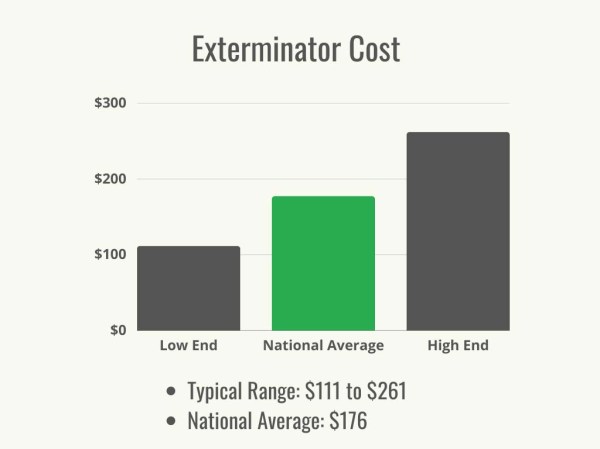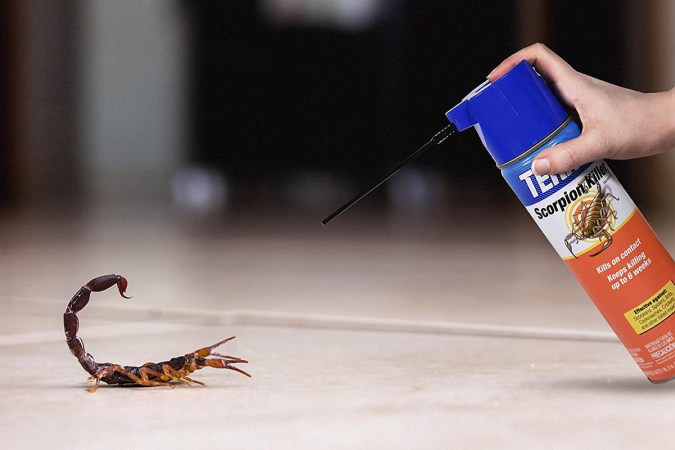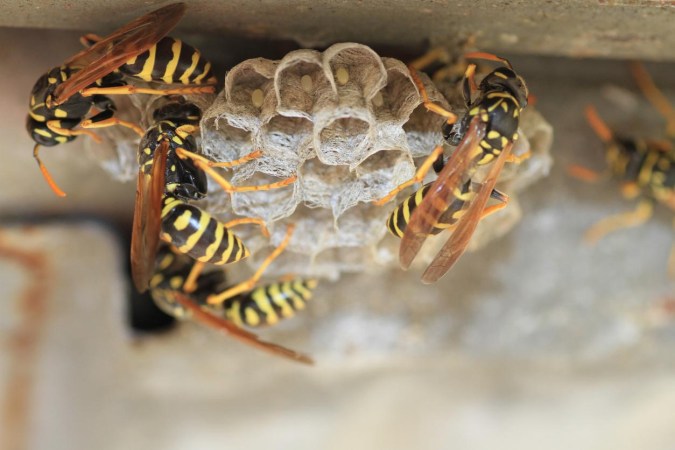We may earn revenue from the products available on this page and participate in affiliate programs. Learn More ›
Highlights
- The typical annual salary range for an exterminator is $29,250 to $58,970, while the national average annual salary is $38,310.
- The salary an exterminator makes will depend on their education level, experience level, any additional skills they have, and their geographic location.
- Pest control professionals can increase their salary by specializing in a niche area, expanding their skill set, offering additional services, networking and building relationships, and by starting their own business.
Exterminators are essential for keeping homes and businesses free of pests such as insects, rats, and other unwanted critters. This steady demand makes pest control a stable career path for anyone. But how much do exterminators make? According to the U.S. Bureau of Labor Statistics, exterminators in the United States typically make between $14.06 and $28.35 per hour, or roughly $29,250 to $58,970 per year. The average salary of an exterminator can change based on their level of experience, where they work, and the kind of pest control services they offer.
Because the best pest control companies typically offer a higher salary and benefits, local exterminators working for a pest exterminator company may make more money than those who work for themselves. A pest control exterminator that specializes in this field might make more money by charging more for specialty services such as bed bug elimination. For those interested in providing exterminator services, becoming an exterminator can be a rewarding career choice to help others maintain a clean and healthy living environment.
An exterminator’s salary is directly related to how much a professional charges for their services and their employer. How much do exterminators cost? The average price range to hire an exterminator runs from $111 to $261, with many homeowners spending an average of $176. The overall cost depends on location, the type and size of the infestation, accessibility, and treatment type.
Factors in Calculating the Average Exterminator Salary
When a homeowner discovers unwanted pests in their home, they will look to get rid of the problem as quickly as possible by hiring one of the best cockroach exterminators or the best mouse exterminators depending on the pest they’re dealing with. The average salary of an exterminator is affected by a number of important factors. These include education level, work experience, additional skills such as specialization in bed bug extermination, and geographic location. Local exterminator salaries can fluctuate greatly due to differences in demand, cost of living, and regional pest control regulations. Exterminators working in urban areas with larger insect populations could command higher salaries than those working in more rural areas. Those who hold advanced degrees or certifications could also be paid more. All things considered, the fluctuation in exterminator pay reflects the changing needs of the local community.
Education Level
Exterminators with higher levels of education, such as a bachelor’s degree in entomology or a related field, may earn higher wages. This is because advanced education often means the exterminator has more expertise when it comes to pest identification, behavior, and control methods. Some states or a specific exterminator company may require certain certifications or licenses, which can be obtained by earning a degree or taking specialized training programs. These credentials can boost an exterminator’s qualifications and lead to higher-paying opportunities within the pest control industry.
According to Craig Sansig, service director at Viking Pest Control in Liberty Corner, New Jersey, “The acquisition of multiple categories of license is helpful in getting higher pay. Certifications from agencies such as the National Pest Management Association’s QualityPro and the associate certified entomologist (ACE) from the Entomological Society of America (ESA) are also helpful. Those with a four-year degree or higher in life science may be eligible for the ESA’s board-certified entomologist certification. Several universities including the University of Florida and Purdue university offer training and certification that is recognized across the industry as well.”
Experience Level
One way that experience level affects an exterminator salary is through increased job opportunities and potential for advancement. Exterminators with more experience can often take on more challenging and higher-paying jobs, such as managing larger accounts or supervising a team of less-experienced technicians. Experienced exterminators are also more likely to have specialized knowledge or skills that can command a higher salary, such as expertise in dealing with specific types of pests or advanced training in the latest pest control techniques.
Exterminators who have been in the field for a longer period of time and have built up a solid reputation are likely to be in higher demand and can earn higher fees for their services. Experienced exterminators can also have established relationships with repeat clients or referral sources, which can lead to a steady stream of work.
Additional Skills
While the primary duties of an exterminator typically involve the inspection and removal of pests, having extra skills can make them a valuable asset to their employer and potentially increase their salary. Having skills related to specific pest control methods, such as integrated pest management (IPM), eco-friendly or organic pest control, or targeted treatments for particular pests can increase the exterminator’s hourly wage. Other skills such as knowledge and experience in safely and humanely handling wildlife pests, strong communication and interpersonal skills, the ability to quickly assess pest infestation problems, attention to detail, knowledge of safety regulations, and having a commitment to staying updated on the latest pest control techniques and trends can all have an impact on exterminator prices.
“Because professional pest management crosses into so many different areas, it is important to be well rounded,” explains Sansig. “Many people seek food processing certifications such as preventative control qualified individual (PCQI), and hazard analysis critical control point (HACCP). Certifications such as … associate certified entomologist, public health entomologist, and board certified entomologist are also very helpful and demonstrate a firm understanding of the basics of professional pest management. For those truly passionate and with the time to pursue it, one can always pursue a formal education in entomology and obtain a PhD in the topic.”
Geographic Location
In densely populated areas and locations with a warm climate (such as larger cities or tropical regions) there tends to be a greater need for exterminators due to the increased likelihood of pest infestations. These areas may have a higher demand for pest control services, leading to more job opportunities and potentially higher salaries.
“Urban centers tend to command a higher salary than do their more rural counterparts,” says Sansig. “Some states have more elaborate licensing schemes that may drive the value of a pest management license as well.”
In cities with a higher cost of living, exterminators can earn a higher salary to offset the expenses of living in those areas. In rural locations with a lower cost of living, exterminator cost may be less expensive because of the decreased demand for pest control. While no one really wants to think about hiring an exterminator, many customers base their decision on name recognition, and many compare Orkin vs. Terminix or other national providers to make their choice.
Some states or counties may have stricter regulations and licensing requirements for exterminators, and this can also affect salaries. Those in regions with more stringent licensing requirements may need to have additional training or certifications, which can lead to higher salaries to compensate for the extra time and effort that’s needed to meet the requirements.
| State | Mean Hourly Wage | Mean Annual Salary |
| Alabama | $17.74 | $36,900 |
| Alaska | $21.41 | $44,530 |
| Arizona | $21.12 | $43,940 |
| Arkansas | $18.08 | $37,600 |
| California | $22.76 | $47,330 |
| Colorado | $24.60 | $51,160 |
| Connecticut | $21.49 | $44,700 |
| Delaware | $22.54 | $46,890 |
| District of Columbia | $23.06 | $47,960 |
| Florida | $20.20 | $42,020 |
| Georgia | $20.16 | $41,940 |
| Hawaii | $20.01 | $41,620 |
| Idaho | $17.55 | $36,510 |
| Illinois | $18.63 | $38,740 |
| Indiana | $19.21 | $39,950 |
| Iowa | $18.76 | $39,020 |
| Kansas | $19.39 | $40,340 |
| Kentucky | $17.38 | $36,140 |
| Louisiana | $18.36 | $38,190 |
| Maine | $22.34 | $46,470 |
| Maryland | $18.91 | $39,340 |
| Massachusetts | $24.63 | $43,030 |
| Michigan | $20.69 | $62,850 |
| Minnesota | $25.14 | $52,290 |
| Mississippi | $18.41 | $38,290 |
| Missouri | $20.51 | $64,400 |
| Montana | $23.51 | $42,650 |
| Nebraska | $20.70 | $48,890 |
| Nevada | $21.53 | $44,790 |
| New Hampshire | $22.96 | $47,750 |
| New Jersey | $22.41 | $46,600 |
| New Mexico | $16.84 | $35,030 |
| New York | $23.19 | $48,240 |
| North Carolina | $18.04 | $37,530 |
| Ohio | $20.29 | $42,210 |
| Oklahoma | $17.32 | $57,200 |
| Oregon | $21.88 | $36,020 |
| Pennsylvania | $19.75 | $41,090 |
| Rhode Island | $19.74 | $41,070 |
| South Carolina | $18.10 | $37,640 |
| South Dakota | $22.39 | $46,560 |
| Tennessee | $19.76 | $41,090 |
| Texas | $17.65 | $36,720 |
| Utah | $19.99 | $41,590 |
| Vermont | $21.24 | $44,170 |
| Virginia | $19.18 | $39,900 |
| Washington | $24.81 | $51,610 |
| West Virginia | $18.66 | $38,820 |
| Wisconsin | $23.41 | $48,690 |
| Wyoming | $20.29 | $42,200 |
| Puerto Rico | $13.19 | $27,430 |
Average Exterminator Salary by Level of Expertise
How much is an exterminator? As with many professions, the salary of an exterminator can vary greatly based on the level of expertise and experience. Whether they’re just starting out in the industry or have years of experience under their belt, their salary can reflect their skills and knowledge. Entry-level exterminators typically start at a lower salary, but as they gain experience and expertise, their earning potential increases. Mid-level exterminators, who have several years of experience, can expect to earn a higher salary than entry-level technicians. Senior exterminators, who have extensive experience and knowledge, often command the highest salaries in the industry.
| Exterminator Expertise Level | Average Annual Salary | Average Hourly Wage |
| Entry-level | $29,250 | $14.06 |
| Mid-level | $38,310 | $18.42 |
| Senior | $58,970 | $28.35 |
Entry-Level
As an entry-level exterminator, salary tends to be on the lower end of the spectrum because of their limited experience and skill level. Entry-level exterminators are in the early stages of their careers, often just starting out in the field. They usually earn salaries of around $29,250 per year, or $14.06 per hour, depending on geographic location and employer. Despite the lower salary, entry-level positions can offer valuable opportunities for learning and development, setting the stage for increased earning potential.
Mid-Level
Mid-level exterminators typically have several years of experience in the field and may have obtained certifications or additional training to advance their skills. These professionals are responsible for performing a wide range of pest control services, including conducting inspections, identifying pests, implementing treatment plans, and providing recommendations on how to prevent future infestations. They can also manage and train newer technicians, as well as communicate with clients. Because of their higher level of experience, mid-level exterminators typically make approximately $38,310 per year, or $18.42 per hour, depending on their employer and location.
Senior
As a result of their expertise and leadership responsibilities, senior exterminators earn the highest salaries in the industry. On average, senior exterminators can expect to earn about $58,970 per year, or $28.35 per hour, depending on geographic location, company size, and whether they have any additional certifications or specializations. They are also more efficient at identifying and solving pest problems, which can save their clients time and money in the long run.
How to Increase Your Exterminator Salary
There are several ways for an exterminator to boost their income and advance their career in the pest control industry. Here are some tips to help make more money as an exterminator.
- Specialize in a specific area. By focusing on a particular type of pest or service, such as termite control or bed bug extermination, a pest control provider can become an expert in that field and demand higher rates for their specialized services. Those specializing in rodent infestations can increase their rat extermination cost based on their extensive knowledge.
- Expand your skill set. Exterminators can take advantage of training and certifications in new pest control techniques and technologies to increase their value as an exterminator.
- Offer additional services. Providing add-on services such as wildlife removal or preventive pest control measures can help exterminators upsell to clients and increase their overall income.
- Network and build relationships. Building a solid client base and establishing partnerships with other businesses in the industry can lead to more referrals for the business and opportunities for higher-paying jobs.
- Consider starting your own business. If an exterminator has the experience and resources, starting their own pest control business can increase their earning potential as an exterminator.
FAQs
Aspiring exterminators often have questions about salary, career paths, and licensing requirements. By learning the answers to some of these frequently asked questions, those interested in pursuing a career as an exterminator can get the information they need to take the first steps.
Exterminator salaries can vary depending on location, but typically exterminators in larger cities or areas with high pest populations tend to make more money. States like Washington, Massachusetts, and Colorado are known for having higher average salaries for exterminators relative to other states.
Exterminators need to have basic qualifications, complete their training, and become licensed. The on-the-job training process typically takes about 3 months, making it an ideal career for those looking for immediate work. Licensing details vary by state, but the basic overall steps include meeting eligibility requirements, deciding on formal training, finishing on-the-job training, developing skills, and becoming licensed. In addition, exterminators will want to have coverage from one of the best small-business insurance companies, such as NEXT or Thimble.
Anyone who uses or oversees the use of restricted use pesticides (RUPs) is required by federal law to hold a certification that complies with EPA guidelines as well as state, territory, and tribal laws. Pesticide applicators need to be proficient in RUP application. In every state, territory, and region of Indian country where RUP applications are submitted, applicators are certified by state, territorial, and tribal authorities. Certain states mandate certification for all commercial applicators—not just those who use RUPs. If a state or territory has more stringent criteria than the federal ones, it’s important to consult with the certifying agency before applying RUPs there. A Pesticide Safety Education Program is available in most states, providing study materials and training.

























